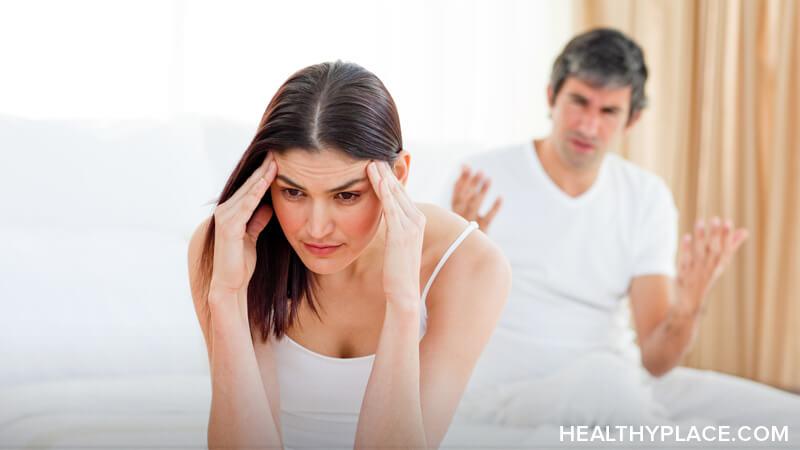Negative Comments and Unsolicited Advice About Anxiety

I receive a lot of negative comments and unsolicited advice as an anxiety sufferer. The average person who has experienced anxiety may think that he has some helpful comments and suggestions for you. Some anxiety management ideas may, in fact, be helpful. Other observations are simply unsupportive or condescending. For the most part, I’ve found that unsolicited comments and advice are not constructive or beneficial to me as an anxiety sufferer.
No, Not Everyone Has an Anxiety Disorder Because He's Been Anxious
I finally came out and told my extended family that I suffer from obsessive-compulsive disorder (OCD). A well-meaning uncle immediately said, “Oh, everyone has that.”
While it may be true that the average person has episodes of rumination, that doesn’t mean that everyone suffers from OCD, which is a specific disorder. His negative comment about anxiety was unintentionally dismissive and I wished he had kept it to himself (Why Anxious People Don't Like Platitudes).
My Anxiety Treatment Is Not Up for Discussion
Other people I’ve encountered skip the subtlety and make grossly unhelpful observations. I received the most caustic comments from someone who I considered to be a friend. He claimed that if I thought I’d had a mental illness since I was five years old, that “the battle had already been lost.”
He also accused me of being an unwitting slave to the pharmaceutical industry because I take medication for my anxiety. Not only was this unhelpful, but his unsolicited comments and advice did irreversible damage to our friendship.
You Can't Just 'Get Over' Your Anxiety
Some anxiety sufferers, whether through personal research or other means, have a breakthrough regarding anxiety and claim that they no longer suffer from it. I’ve seen this on countless support group boards. A person is suddenly symptom-free and therefore thinks you should be able to get over your anxieties, too. I wish it were that simple for most of us. My primary disorder, OCD, will not miraculously resolve itself, as it is chronic. Saying that you should be able to just “get over” your anxieties is often inaccurate and completely condescending.
Negative Comments and Unsolicited Advice Are Usually Well-Intentioned
A relative of mine recently suggested that I try going off of all of my medication. I immediately refused, because I know what it was like to suffer before I started a regular medicine regimen. Although she meant well, I know my brain chemistry needs to be professionally adjusted. I also know from experience to follow my psychiatrist’s instructions with extreme caution (How to Be an Empowered Patient).
Most people aren’t out to destroy you with their negative comments and unsolicited advice. It can be a good thing to try out the more helpful suggestions if you can. Many friends, relatives, and others are just looking out for your wellbeing and want to see you thrive despite your anxiety. But each anxiety episode or disorder depends on the individual, and not all solutions work for all people.
You have to keep doing what you do for self-care, whether it’s taking supplements, medications, attending therapy, or simply taking the day one breath at a time. Ultimately, no one knows what is best for your anxiety but you and your caregivers.
APA Reference
Slavin, C.
(2017, October 12). Negative Comments and Unsolicited Advice About Anxiety, HealthyPlace. Retrieved
on 2025, November 29 from https://www.healthyplace.com/blogs/anxiety-schmanxiety/2017/10/negative-comments-and-unsolicited-advice-about-anxiety
Author: Cheryl Slavin
I never share my anxiety problems with anyone now because instead of helping people make fun of it and don't provide good solution.. Instead i'm making my routine healthy including daily exercise, medication, spending time with my pets and spend time with my loved ones. Which really help me to overcome this anxiety.
I have learned to not advertise my GAD anymore. I just deal with it. Much of it is triggered by environmental sensors, such as excessive worry and dwealing on the past. Medication helped for a while, but then kind of stopped. So I quit taking them. I agree, the advice you usually get from others isn't good. Sometimes it elevates anxiety to a higher level.
Yes, I still haven't managed to shut up about mine. Most people find my honesty about it refreshing. Those who stigmatized me can just be thankful that they've never had to deal with anything like that. It does still hurt, though. Some people wish I would shut up about it I'm sure, especially on social media. But a lot of people have been grateful that I shared because they or a loved one have had similar experiences. I still have good days and bad days, and I'm still blogging about it all on my personal site. I hope you find some relief. GAD is a beast.